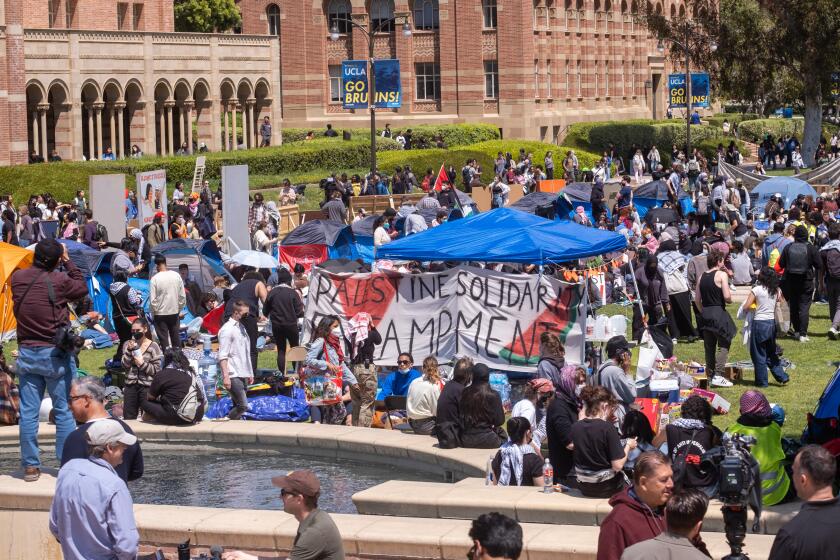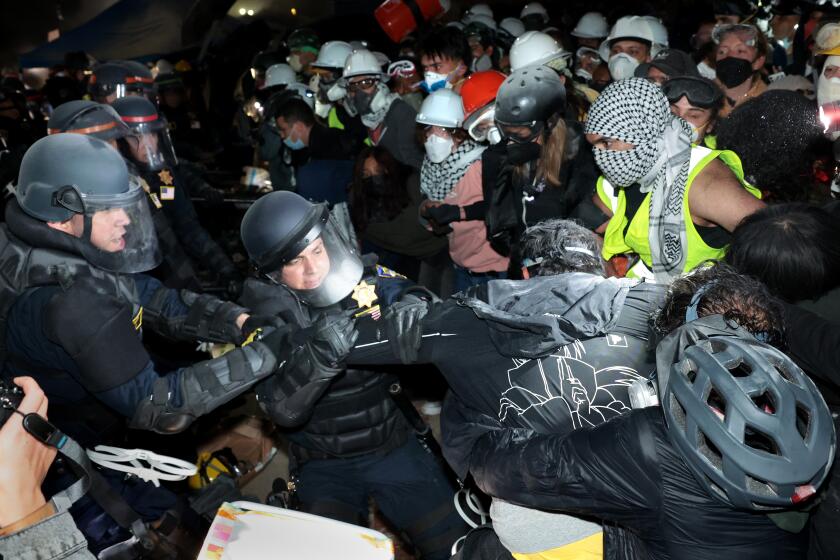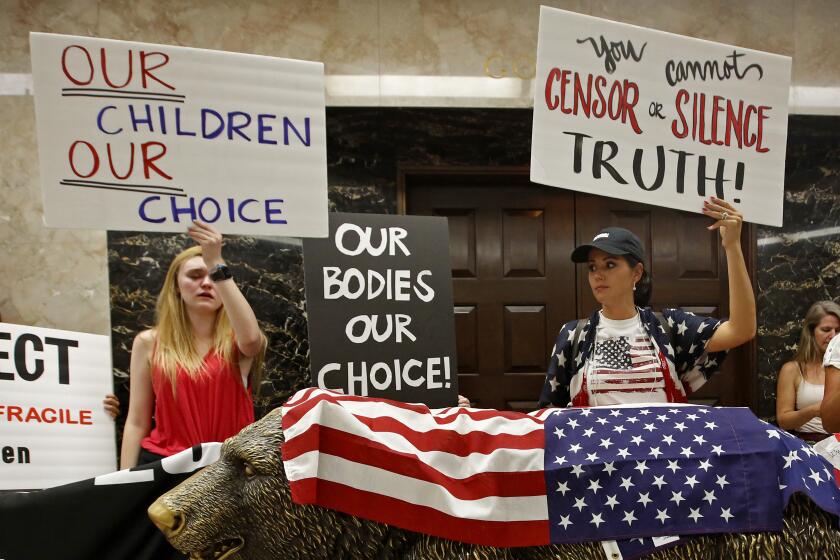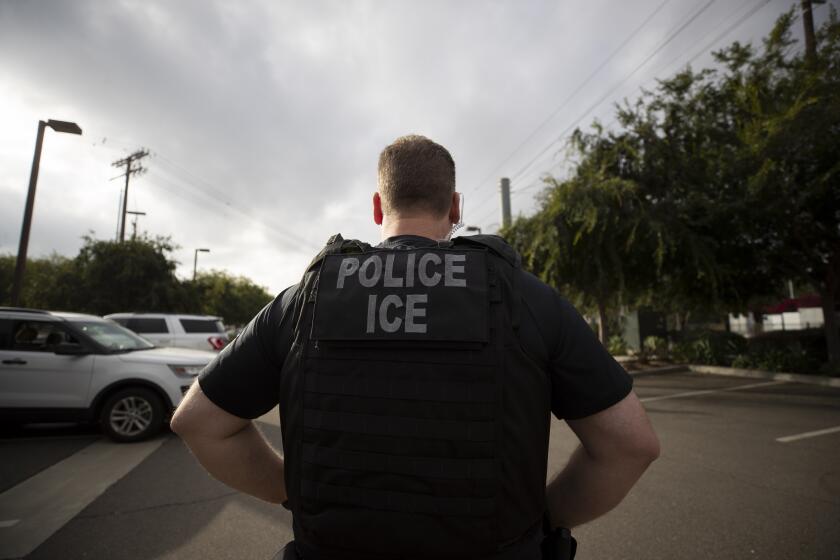Zero tolerance at UC campuses in new order banning encampments, masking, blocking paths

- Share via
University of California President Michael V. Drake on Monday directed chancellors of all 10 campuses to strictly enforce rules against encampments, protests that block pathways and masking that shields identities amid sharp calls to stop policy violations during demonstrations such as those over the Israel-Hamas war that roiled universities in the spring.
As students begin returning to school this week, Drake also sent a letter to the UC community affirming that the right to protest, exercise free speech and voice diverse viewpoints was fundamental to the mission of the university — the birthplace of the Free Speech Movement, he noted. He said the “vast majority” of campus protests are peaceful and nonviolent, but “some of the activities we saw over the past year were not” and needed to be addressed.
“Clear communication and consistent application of policies and laws are key to achieving the delicate but essential balance between free speech rights and the need to protect the safety of our community and maintain critical University operations,” he wrote.
He told chancellors that rights to free speech and academic freedom must not “place community members in reasonable fear for their personal safety or infringe on their civil rights.”
Also Monday, California State University Chancellor Mildred A. García and 23 CSU campus leaders issued a systemwide statement about protests. The university said campuses “must maintain an environment where its work can be conducted without disruption.”
The letter linked to a CSU website that listed banned activities, including “camping, overnight demonstrations, or overnight loitering” and “unauthorized temporary or permanent structures, walls, barriers, barricades, furniture, or other objects.” The policy states, in part, that illegal activity includes “vandalism, property damage, trespass, occupation of a building or facility, refusal to disperse in violation of the law” and promoting or inciting violence or harm.”
“Institutions of higher education have a special obligation to encourage and support the free expression of ideas, values, and opinions, even where they may be unpopular or controversial, García wrote.
Drake’s letters responded to rising criticism from some regents, faculty, campus security, legislators and others that the protests had gotten out of control and UC needed to consistently enforce campus rules around them. The top-down presidential directive, which allows for few if any exceptions, is unusual in a system that values the independent decision-making of its campus chancellors. Drake said, however, that he consulted widely over the summer with regents, campus leaders, faculty, students and others in shaping UC’s approach on protests going forward.
Some Palestinian supporters expressed outrage Monday, accusing UC of shutting down constitutionally protected speech in hostile actions aimed at silencing their voices. But those backing Israel said UC had finally acted as it should have months ago to protect the campus community.
Since the Israel-Hamas war broke out Oct. 7, many college campuses across the nation have exploded in the largest student demonstrations since the Vietnam War. Supporters of Israel held marches and rallies to condemn Hamas militants for their bloody attack that killed about 1,200 in southern Israel and took about 250 Israelis and foreign nationals hostage.
Backers of Palestinians countered with their own protests, encampments, graffiti and building takeovers to voice their outrage over Israel’s sustained military assault on Gaza, which has killed more than 40,000 Palestinians, according to the Gaza Health Ministry. They have called for UC to divest from companies that do business with Israel.
Controversy over how college leaders have handled the protests triggered a congressional hearing and the resignations of the presidents of three Ivy League institutions: Harvard, Columbia and the University of Pennsylvania. At UC, chancellors were authorized to handle the protests as they saw fit and all of them allowed pro-Palestinian supporters to put up encampments beginning in April.
Rich Leib, outgoing chair of the UC Board of Regents, says encampments should be banned, but protests that follow campus rules are welcomed as free speech. Many regents, senior leaders agree.
Initially, the UC encampments were peaceful gathering spots for teach-ins, art projects and other pro-Palestinian solidarity activities.
But they began attracting counterprotesters — and, at UCLA, a violent melee. Complaints rose as Jewish students and others said the tents were impeding university operations and access to pathways and buildings. At UCLA, San Diego,Santa Cruz and Santa Barbara, chancellors eventually called in law enforcement to take down the encampments in controversial operations that sparked intense criticism. Faculty at UCLAand UC San Diego conducted no confidence votes of their chancellors — both unsuccessful. At UC Irvine, campus police called for outside backup after protesters took over a lecture hall, then law enforcement dismantled the encampment.
A different outcome played out at Riverside, Berkeley, Davis, Merced and San Francisco, where protesters ultimately left their encampments peacefully.
Meanwhile, the cost of protest management spiraled to $29 million across the system, with most of that spent on outside law enforcement and security officers along with graffiti cleanup, property repairs, waste removal and pest control.
Lawmakers, unhappy with UC’s handling of protests, have directed Drake to develop a “systemwide framework” to provide consistent enforcement of rules — and are withholding $25 million in state funding until he delivers a report on his efforts by Oct. 1. They also have directed CSU to take similar steps, although no state funding is directly involved.
The push for systemwide enforcement of rules, especially the ban on encampments, began last spring during a Board of Regents meeting where Regent Jay Sures made a motion to direct Drake to order consistent enforcement of rules. But it failed — infuriating him, he said — amid questions among other board members about the need for a directive. Sures said state legislators, especially the California Legislative Jewish Caucus, helped push UC to act by tying stricter protest management to the state funding.
Sures, vice chairman of United Talent Agency and an outspoken supporter of Israel, also led successful efforts to ban criticism of Israel and other opinion on the landing pages of UC websites — while allowing it on other pages marked as commentary. He said UC took too long to act, but he was satisfied for now.
Regent Rich Leib, who served as board chair during the last year of protests, said regents are now “in complete agreement” with UC’s approach and applauded Drake for his “clear direction.”
James Steintrager, UC Academic Senate chair, said it was a “good thing” to clarify and broadly communicate campus protest rules. But he said he and other faculty are concerned about whether enforcement of bans on masking could put students at risk for doxxing. He also questioned whether requirements to show ID could lead to profiling certain groups. “Implementation is really the key here,” he said.
Student and faculty supporters of Palestinians blasted the UC president.
Saree Makdisi, a UCLA professor of English and comparative literature, blamed UC for created a “crisis” over protests by failing to prevent violent outsiders from attacking a peaceful encampment at the Westwood campus, calling in riot police on student demonstrators and refusing to respond to campus supporters of Palestinians.
Makdisi said UC was “running roughshod over the proud tradition of teaching, learning and critique that gave the UC system its global reputation, putting it at risk.”
Sean Malloy, a UC Merced associate professor of history and critical race and ethnic studies, likened UC’s crackdown to then Gov. Ronald Reagan’s harsh suppression of student demonstrators during the Vietnam War. “Make no mistake, despite all the talk of content-neutral and existing regulations, this announcement was done to please those who would rather the UC remain silent about Israel committing genocide in Palestine,” Malloy said.
Students say the stepped-up enforcement of rules won’t deter them from protesting when they return to campus this fall.
“We will continue to pressure the university to divest and end their complicity and profit from the genocide that’s happening in Gaza in whatever way that looks in the fall,” said Mona, a UCLA undergraduate student and part of the spring encampment who did not use her last name because of safety concerns.
Nailah, a member of the UC Irvine Divest Coalition, said Drake’s directive wouldn’t make students safer but was a “clear violation of student rights and abilities to speak up on campus.”
Sarah Bacon, who joined the UC Santa Barbara encampment, questioned whether UC would take such action if the protests were not directed at a target other than Israel. Several campus members said UC officials allowed without incident tent encampments during the Occupy movement in 2011 and building takeovers during the 2022 UC academic workers strike, for instance.
“What’s new is all the communication on this and the enforcement of policy that is directed explicitly against pro-Palestinian protesters,” Bacon said. “If this was a different cause, would the reaction be the same? That is what’s concerning to me,” Bacon said.
Under the state legislation, the UC must notify all students by the beginning of fall term about rules around free speech activities, student codes of conduct, nondiscrimination policies, campus processes to resolve alleged violations and potential consequences, among other requirements. The state report must also include UC efforts to consistently enforce policies and laws “that protect safety and access to educational opportunities and campus spaces and buildings.”
Drake’s letter to chancellors instructs them to provide on a web page or document existing policies that apply to protests and demonstrations before fall term begins — this month at UC Berkeley and UC Merced and in September for the others. The information will specifically notify campus members about bans on camping or encampments, erecting unauthorized structures, restrictions on free movement, refusal to reveal one’s identity when asked to do so by university staff and some masking.
State law bars wearing face coverings to conceal identity to avoid recognition while committing a crime, which will be incorporated into all campus rules. UC policy also bars masks worn to intimidate others. But masking to protect health, or worn during peaceful rallies and authorized protest gatherings, will be allowed, a UC official said.
UC Berkeley unveiled its new website on free speech policies and protest rules on Monday.
The University of California shelled out an estimated $29 million to handle this spring’s protests over the Israel-Hamas war, with 90% of the costs going toward law enforcement.
If policies are violated during protests, Drake said chancellors should continue to use UC’s progression of actions known as “tiered responses.” People must first be informed about a violation and given a chance to change their behavior. If they don’t, a warning of consequences is next. After that, UC police or the campus fire marshal will assess the situation and issue a notice of an unlawful assembly if warranted. Those who refuse to change their conduct may be cited for breaking university rules or cited, detained or arrested by police.
The letter to chancellors, however, said those guidelines are “not a rigid prescription that will capture all situations” and doesn’t dictate a specific time frame. That leaves chancellors some discretion over how far and fast to crack down on violations.
Drake said all UC members cited for violations must go through the campus disciplinary process — rejecting appeals for amnesty by some protesters and their allies. Disciplinary measures for students include warnings, probation, restitution, suspension or dismissal. Staff and faculty are subject to written censure, demotion, suspension without pay and dismissal, among other sanctions.
“Our ultimate goal is for all of our community members to feel supported in their ability to express themselves and to pursue their studies, research, patient care and other work on our campuses,” Drake wrote to the UC community. “We also want our community members to understand what’s expected of them, including a clear understanding of the principles, policies and laws that govern our behavior on campus.”
More to Read
Sign up for Essential California
The most important California stories and recommendations in your inbox every morning.
You may occasionally receive promotional content from the Los Angeles Times.














